The Latest News and Views about ANTINOUS the GAY GOD
Compiled and Updated
By
Hernestus, Priest of Antinous

JANUARY 28th 2009
The Latest News and Views about ANTINOUS the GAY GOD
Compiled and Updated
By
Hernestus, Priest of Antinous

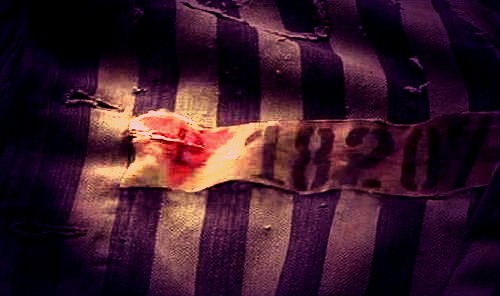
This is the day we honor The Men with the Pink Triangles the gay men who were persecuted by the Nazis. Jews were forced to wear a yellow star. Gays wore a pink triangle.
Antinous stands for all of us. He stands for the good times of being gay. But he also stands for the horrible times when we plunge into the depths and drown.
Antinous is the spirit of gayness in all of us. Antinous was thus all the Men with the Pink Triangles.
Everybody knows that gay men were persecuted by the Nazis. But only recently, shocking new documents have come to light showing that the Nazi crackdown on gays was even more widespread and insidious than previously believed.
After German unification hundreds of thousands of case histories were released and historians have been sifting through them. Their findings are just now being published. And the findings have shocked even many historians who knew that atrocities had occurred, but were surprised by the extent of them.
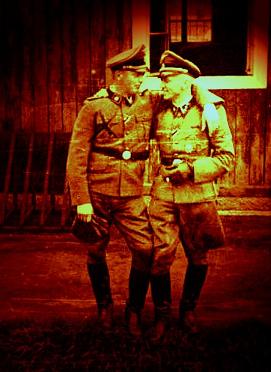
The Gestapo launched a systematic crack-down on gays in the mid-1930s. They actively entrapped gay men. They set up spying stations behind one-way mirrors in public toilets. Plainclothes men patrolled parks.
The Gestapo created a vicious protection racket that allowed gay bar owners to remain in business, under condition that they handed over names of customers on a regular basis. If a patron got drunk one night and said something catty to the bartender, the next day he found himself being interrogated by the Gestapo, who already had a big dossier on his activities going back years.
Landlords were bribed to inform on tenants. If someone at work didn't like a bachelor co-worker, all he had to do was to go to the Gestapo and suggest a sexual advance had been made, and the next day the co-worker would be gone.
It mattered little whether there was any truth to the allegation. Everyone knew that Nazi ideology demanded procreation to produce a Master Race of blond and blue-eyed Aryans. Anybody who didn't get married and sire lots of kids was already practically a criminal. Being a bachelor automatically made a man a suspicious character in Nazi Germany.
Paradoxically, and cruelly, gay men were offered the alternative of "voluntary castration" with vague promises of leniency. In return for naming names of every gay man they knew, they would undergo botched operations that left them with oozing wounds. And they would still end up in concentration camps.
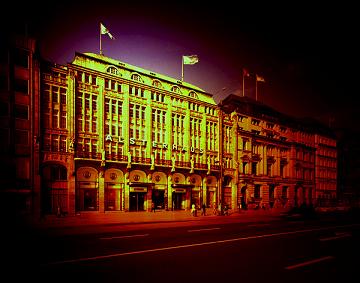
Right here in the German city of Hamburg, where I have lived for about 25 years now, there is a macabre Gay Holocaust Walking Tour. It starts in front of the city's biggest and most venerable department store, Alsterhaus, on the city's main street, overlooking a lake and a park which has been a prime gay cruising district since at least the 18th Century. In the 1920s Hamburg was a gay paradise. English writer Stephen Spender described in detail the pleasures of cruising for "seafood" in Hamburg port-side gay bars around 1930.
Like all department stores, Alsterhaus had a large gay clientele as well as a large gay staff. It was at Alsterhaus that the gay pogrom in Hamburg started. It was in the summer of 1937. Gestapo men in leather trench coats entered the store during business hours and rounded up about 40 gay employees, who were hauled off in vans waiting out front on the street facing the park and lake.
The raid followed months of investigation. Co-workers, bar owners and neighbors had informed on the men, who had been tailed surreptitiously. They went to work that bright summer's morning at their perfume counters, and sorting ribbons in the notions department, at their desks in accounting and personnel not realizing they were about to be hauled off to their deaths.

What followed was weeks and months of "protective custody" and transfers to mental asylums for "curative treatment" and eventual sentencing to concentration camps.
Many were still wearing their pink triangle patches on their prison uniforms as late as 1946 because post-war courts had upheld their Nazi-era convictions for "unnatural behavior," despite the fact that all other Nazi-persecution convictions were dropped. Some men were still in prison in the early 1950s.
The Alsterhaus department store raid was just the beginning. Raids occurred with growing frequency in the late 1930s.
The newly revealed documents show that the raids in Hamburg were repeated all throughout the Reich. In all, 54,000 gay men died at the hands of the Nazis in Germany, 7,000 of them in Nazi death camps.
The gay historical walk through Hamburg takes you past one-time gay bars and gay-owned businesses, past the Gestapo headquarters and past a publishing house that specialized in gay magazines. Imagine my shock when, during the walking tour, the tour guide held up one of those old 1930s gay magazines and the cover photo was of a bust of Antinous. It was one of the few copies of the magazine that was not confiscated and thrown on a pyre and burned to ashes along with other "decadent" literature.
With Prussian thoroughness, the Nazis documented every detail of the lives of those they rounded up. Those documents provide chilling insights into a hitherto unknown story.
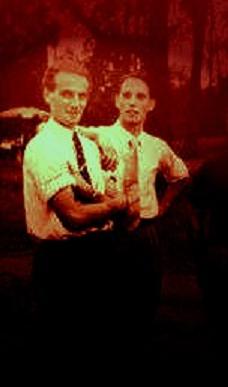
There was the case of August Huenfeldt, a 26-year-old man who, according to the court documents, had played with dolls and dressed up as a girl "in perverted games" as a boy. He rented a room from a married couple in an upper-story apartment in the center of Hamburg. Since bars and parks and public toilets were too risky, he preferred to bring his boyfriend back to his room, where they locked the door and kept their voices low as they had sex.
But unbeknown to them, their friendly landlady and her husband, Herr and Frau Schmuck (nomen est omen!), both about 25 and "like brother and sister" to Huenfeldt, would sneak up to the door to his room. Using a chair, they would peer through the transom above the door and watch the two men having sex.
The Schmucks took notes. They called the Gestapo and handed over their notebook with lurid descriptions of the goings-on in that room.
The Gestapo arrested Huenfeldt but had no name or address for his friend. So the Schmucks were told to set a trap for him. A few days later he came to them saying he had not heard from Huenfeldt for some time. They said Huenfeldt had just stepped out but would be right back, if his friend would care to wait in his room for Huenfeldt's return.
The Schmucks showed him to the room, and then locked the door behind him and notified the Gestapo that the trap had sprung shut. He was hauled off a few minutes later.
The Gestapo had only circumstantial evidence, the hearsay provided by the Schmucks. But in the twisted mindset of the Nazis, the word of a married couple carried weight over that of unmarried men who met behind closed doors. Under torture, of course, both men admitted everything.
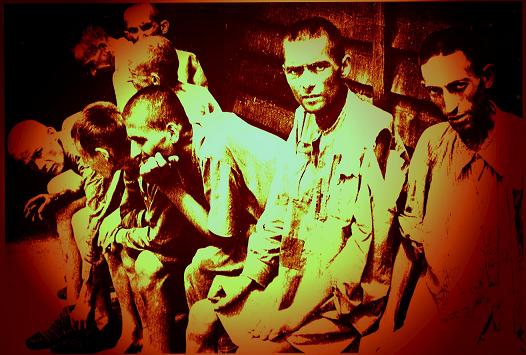
And under torture, and under "promises" of leniency, gay men informed on each other. Oftentimes, gay men were told their friends would come to no harm and that, on the contrary, perhaps their friends could put in a good word on their behalf.
It was all lies, of course. Every name was followed up with Prussian precision. Everybody who was named was also rounded up and tortured to squeeze out more names and more "confessions. " Protestations of innocence were useless. After all, who could believe a pervert? Hitler himself had used that argument in court-martialing one of his generals after being informed of a rumor that the general was homosexual. The general swore on his "word of honor as a Prussian officer" that he was not homosexual and it was all a frame-up. But Hitler reportedly said, "Such low-life scum perverts have no honor to swear by!"
One of the most chilling cases was that of Carl Bruns and Heinrich Roth, a gay couple who ran an upscale men's clothing shop in downtown Hamburg right across the street from Gestapo headquarters.
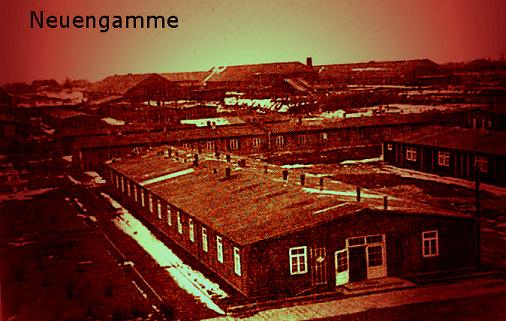
Bruns and Roth were well respected. They lived together with Bruns's elderly mother in an expensive apartment overlooking the lake in Hamburg. Schildt was a professional photographer and did all the advertising shots for the shop as well as taking snapshots of him and Bruns on summer excursions with Mama Bruns.
It is unclear that Bruns and Roth, both middle-aged in the 1930s, ever engaged in any behaviour that would come to the attention of the Gestapo. But their shop was right across the street from Gestapo headquarters. So they couldn't escape scrutiny.
Bruns and Roth were arrested in 1940 and were sent to the infamous Neuengamme concentration camp near Hamburg where a majority of the inmates wore the Pink Triangle badge. Neuengamme had one of the Third Reich's largest homosexual inmate populations. Gay inmates from throughout the reich were sent to Neuengamme. By some miracle, both men survived until the May 1945 when the camps were being liberated by Allied forces.
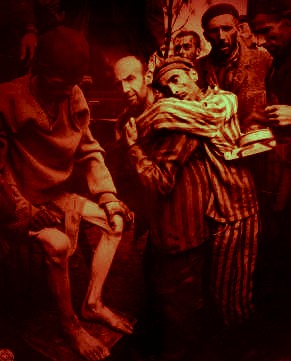
That's when the final tragedy struck for Bruns and Roth.
Auschwitz was liberated by the Red Army on January 27, 1945, and the pictures of skeletal camp inmates shocked the world. In response, Heinrich Himmler issued an order to all camp commandants that they were to ensure that no camp inmates should ever fall into the hands of Allied forces. He didn't specify what they should do, leaving it in the hands of camp commandants.
Some commandants at Dachau and other camps began gassing all surviving inmates so that none would be left alive. Others began evacuating their inmates.
Thus Bruns and Roth were forced to leave the Neuengamme concentration camp near Hamburg on a forced march to the Baltic Sea, 100 kms (60 miles) away, where the converted cruise liner Cap Arcona was at anchor.
This was in mid-May 1945. Hitler was dead. The Allies were advancing on all fronts. Everyone knew that the war was over. All the inmates had heard the news. British forces had dropped leaflets saying they would be in Hamburg within hours.
And yet these men were sent on a Death March to the sea. Stragglers were machinegunned to death. Others collapsed and died of exhaustion. Bruns died along the way. Roth made it to the Baltic Sea docks where the Cap Arcona was waiting and he was herded aboard along with thousands of other inmates.
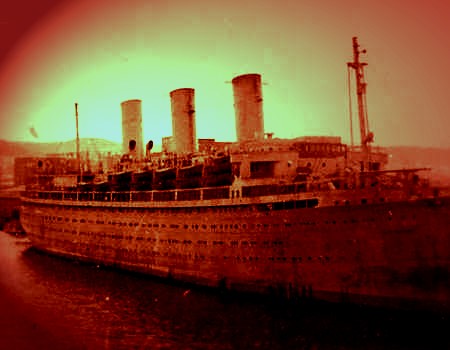
It was May 19, 1945. The British RAF was conducting intensive air raids to pave the way for ground forces, which were only a few miles away. RAF fighter-bombers had been told that Nazi officials were seeking to flee Germany aboard a big ship disguised as a refugee vessel.
The RAF planes came in and bombed and strafed the Cap Arcona, setting it ablaze and sending it to the bottom. Those inmates who managed to dive into the water were either killed by the bombs and strafing from the planes or else were machinegunned by Gestapo men as they tried to climb ashore after all, the Gestapo had orders to make sure no camp inmates fell into the hands of the Allies.
A handful found shelter in reeds along the shore and were found shivering in the water by British soldiers a few hours later.
The Cap Arcona had been the last bombing raid of the war in Europe. Schildt, the photographer-haberdasher from Hamburg, didn't survive it.
Just one final note to this sad story. The big department store in the center of Hamburg where the pogroms against gay men started in 1937 was recently renovated. When construction workers peeled away a 1950s false ceiling on the top floor of the store, they discovered a beautiful stained-glass skylight which arches over the central atrium of the store which had permitted sunlight to cascade down six floors to the ground floor lobby.
The skylight, designed by artesans before World War I, is composed of stained-glass panels depicting the Constellations of the Heavens in vibrant colors. The name of each constellation is written in flowing script. And there just below the Eagle is a small constellation inscribed ANTINOUS in bold and flowing letters.
Antinous saw it All. Antinous WAS the Men With the Pink Triangles.
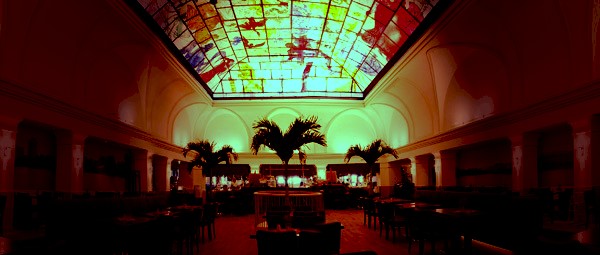
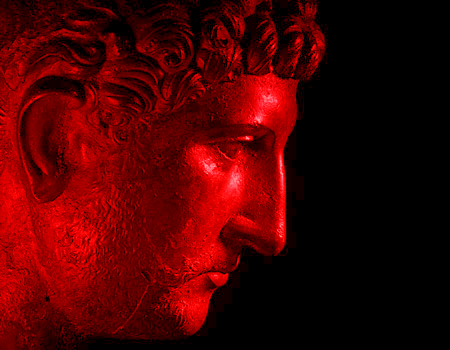
Hadrian was fascinated perhaps "obsessed" would be a better word with astrology and with magic and with strange folk customs.
So no doubt he is looking down from the Antinoian Barque of Millions of Years with a certain amount of bemused interest at the millions of mortals who are making last-minute preparations for Chinese New Year celebrations amidst a highly inauspicious Annular Solar Eclipse.
In all his far-ranging travels, Hadrian never quite made it to China.
But just imagine how intrigued he would have been by this glorious ancient civilization, in many ways the rival of Rome and in some ways surpassing Rome. Yes, Hadrian would be intrigued by what he sees today.
The Divine Hadrian's birthday was January 24th (see the previous entry below) and coincided with a rare conjunction of the Sun and Jupiter in the Sign of Aquarius. That happens only once every dozen years.
And now, on the 26th, the Sun aligns with ANTINOUS THE MOON GOD in the first New Moon of the Year 2009. Which is also Chinese New Year's. Ordinarily, this would be a day of merriment and partying. Ah! But ANTINOUS THE MOON GOD eclipses his heavenly father Ra-Herakhte on January 26th at almost exactly the stroke of midnight Sunday night in Hollywood at 8 p.m. Monday evening in Hong Kong when the gala New Year's street parade officially gets underway, ushing in the Year of the Ox.
The Asian news media are buzzing with astrological predictions most of them deliciously contradictory about whether the hard-toil Year of the Ox will be a good year or a bad year owing to the New Year's Eclipse.

A dark red shadow will creep across the Sun and this can be observed from many countries in the Eastern Hemisphere, including Western Australia, Bangladesh, Burma, Cambodia, China, India, Indonesia, Malaysia, Singapore, Philippines, Thailand, Sri Lanka, South Africa and Taiwan.
While red is a highly auspicious and fortune-bringing color in Chinese folklore, this eerie reddish sunlight is viewed as unfavorable in Chinese astrology. So Chinese astrologers are having a field day with this celestial event.
A prominent Chinese astrologer in Malaysia is advising revelers to abstain from "sleeping, eating, drinking, working, engaging in conjugal relations, holding meetings or weddings, as well as all religious or special events of any and all kinds." Indeed, it is hard to think of anything that people CAN do aside from hiding under their beds.
The Malaysian astrologer told his readers, "I understand this can be difficult with it being Chinese New Year but revellers should try to take precautions at least during the three-and-a-half hours of the eclipse.
After the eclipse, people should wash and clean their houses to remove all harmful energies that would have set in and offer prayers and THEN they can go out and join the street parties and set off fireworks.
Hadrian is having a good old chuckle as he hears all of this. It will remind him of the contradictory and often fanciful advice that his own astrologers and soothsayers and court magicians offered to him during his 20-year reign as emperor.
Hadrian drew up his own astrological charts, of course. He was initiated into the Eleusinian Mysteries at Delphi, as indeed was the great Hercules. During their trip through Egypt, Hadrian and Antinous visited Heliopolis. That is the town near Mennefer (Memphis/Cairo) where the Egyptian magician/priest Pancrates gave to Hadrian or rather, sold to him at an exhorbitant price a magical spell which could bind another man's affections to him forever ... when the spell was cast properly. If cast wrong, the spell would result in the death of the other man.
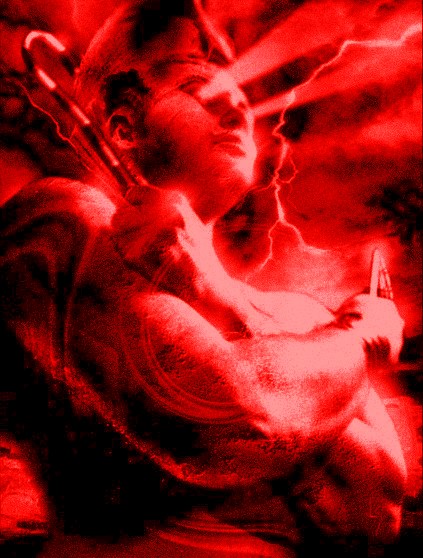
There was some speculation in ancient times as to whether the death of Antinous may have be related to this strange Egyptian spell. Whether you or I believe in the efficacy of Ancient Egyptian Spellcasting, Hadrian most certainly DID believe in magical spells being the wise man that he was.
Let's assume Hadrian cast the spell a few days or weeks prior to the death of Antinous. Well, that would certainly explain his inordinate grief at the Blessed Boy's death and his penance in declaring Antinous a god ... perhaps out of a profound sense of guilt.
Historians have speculated on this point for centuries.
But back to the First Solar Eclipse of 2009. How would Hadrian have responded to the dire croakings of doom by the astrologers? Would he have retired to his chambers to hide under the bed? Or would he have ensconced himself inside his own private observatory at his Tibur Villa and have studied the hues of gold, purple and red as the face of ANTINOUS THE MOON GOD slid in front of the Sun?
History tells us that Hadrian was not one to hide under the bed like a superstitious slave. Instead, he preferred to stride forth and witness first-hand the Celestial Mysteries of the Gods. He didn't mind taking risks when it came to delving into the Divine Mysteries.
For example, it was at the Autumnal Equinox in the year 129 that the imperial court ascended Mount Cassius in Syria, on top of which was a Temple of the Sun.
A storm broke while they made their pre-dawn ascent. The bodyguards and priests advised the Emperor to turn back. No doubt some faint-hearted members of the entourage did turn back. But not the Emperor. Undeterred, Hadrian and Antinous forged ahead, buffeted by wind and rain. Hadrian instructed the priests to conduct the Equinox ceremony in the rain.
During the sacrifice at the altar, a bolt of lightning struck with an apalling, earth-shattering clap of thunder killing the priest and the sacrificial animal together. The oracular priests took this as a very significant portent of life energies transferred to the Emperor. The full implications of this portent were comprehended perhaps only by Antinous alone. The darkness of the coming death and transfiguration were presaged. Whatever thoughts went through the lovely head of Antinous, Hadrian took the incident as a sign that the gods of Syria had turned against him, thinking it was Baal-Zeus who struck down the priests as a warning to Hadrian of what lay ahead when the court entered Jerusalem.
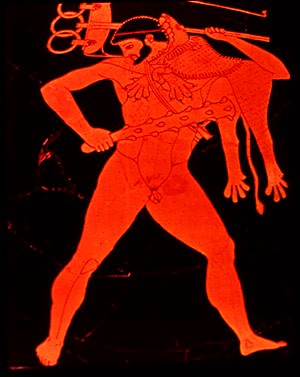
Perhaps it is all a myth and a legend, of course. There were many myths and legends about the events leading up to the deification of Antinous. But the Lightning Bolt Omen on Mount Cassius was taken a harbinger of things to come. It was theorized that Antinous began to get the idea of sacrificing his own life on behalf of his beloved emperor but there is no way to know what was in his youthful mind as he witnessed what must have been a truly traumatizing sight.
Was it a bad omen? Or was it a good omen which only Hadrian and Antinous were able to discern while everyone else ran for shelter from the lightning bolts?
We do not know the answer to those questions. All we know is that Hadrian and Antinous did not shrink from the approaching storm. They did not hide under their beds. Hadrian may not have scoffed at his astrologers and soothsayers indeed, he may have known more about their arts than they did. But he was not a superstitious man who crawled into the darkness to hide from the malefic rays of an Annular Solar Eclipse.
Hadrian was a confirmed pagan and he believed in astrology and magic and Mystery Teachings. But he was not at all superstitious. He was a risk-taker like Hercules who, like Hadrian, had been initiated into the Eleusinian Mysteries. Actually, that's not entirely true. Hercules did not complete the Eleusinian initiation ceremony.
Hercules was famous in the Ancient World for irreverently thumbing his nose at sacred conventionality. It is said that Hercules was supposed to be initiated into the Eleusinian Mysteries in preparation for his Twelfth Labor, The Capture of Cerberus. But he was not able to be initiated because he had committed a murder. The priests said he was unworthy of proceeding any further.
Did Hercules slink away in humiliation and disgrace? No. Hercules merely shrugged, turned on his heel, and said: "I have been initiated into mysteries by far TRUER than these...I have beheld the Divine Fire...and I have observed the Gods at work." Hadrian would have known these words by heart.
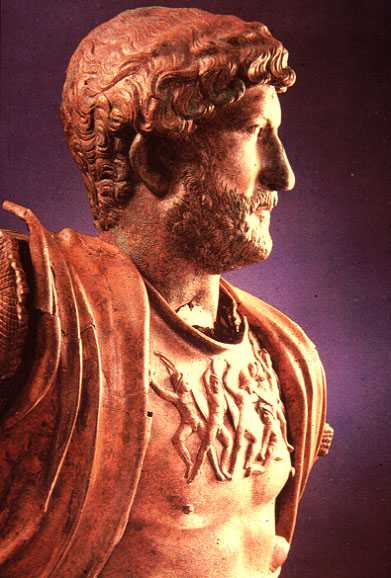
On January 24th the Sun aligns with Jupiter in Aquarius for the first time in a dozen years, setting the celestial stage for a jovial celebration of Hadrian's Birthday.
Hadrian was obsessed with astrology and magic and Mystery Teachings, so the extraordinary Aquarian conjunction of the Sun and Jupiter would have piqued his interest, particularly since the Moon joins this conjunction later this weekend, causing the first Solar Eclipse of 2009.
Antinous had been dead for two years when, shortly after the Emperor's birthday in the year 132, the Imperial Astrologers first sighted the STAR OF ANTINOUS and informed Hadrian of the new light in the sky.
Many historical novels have been written about the story of Hadrian and Antinous and the discovery of the Star of Antinous. One of them was written back in the mid-1950s by a German author named Ernst Sommer and has never been translated into any other languages. It is simply entitled Antinous and, while it is not very historically accurate, it presents a very moving and inspiring tale of the love between Hadrian and Antinous.
One key element of the novel's plot is the fact that Hadrian and Antinous never have sex. Everyone assumes they are having sex, and it is discussed at length by other characters in the course of the book. But there is no sex between the two. Antinous balks and refuses to be "taken" by the emperor. Hadrian begs. He pleads. He says, "I know you love me more than anyone else loves me. You are the only human being in the world who truly loves me. Why won't you express it physically?"
But Antinous steadfastly refuses, saying he is not prepared to go all the way, that carnal relations would sully the purity of the love they share. He says flatly that as emperor, Hadrian can take his body any time he pleases. To which Hadrian sagely says he does not want to take Antinous's love by command. He wants to receive it as a gift.
"Then you must be patient with me," Antinous replies tenderly. "I want it to be a beautiful gift that I give to you willingly. It must be the perfect day, at the perfect hour, under the perfect star. And then, when that hour comes, we shall both know that the time is right. And I shall surrender to you all that I have to give."
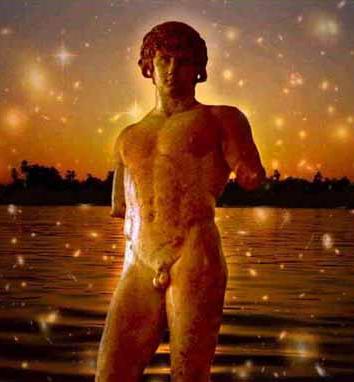
The dramatic climax of the book comes as Hadrian lies in a villa in Hermopolis, feverish and at death's door after having been bitten by a mosquito. The emperor writhes in bed, calling out Antinous's name. But the Empress Sabina and heir-to-the-throne Lucius, jealous but also fearful that the presence of Antinous might further agitate the emperor, issue orders that the boy be kept away from the emperor.
After several daring attempts to sneak into the villa, Antinous is finally put under house arrest aboard an imperial vessel anchored a few miles upstream near the fallen-down Temple of Bes. Lucius has ordered that he be put in irons to prevent him from sneaking off to visit Hadrian. But his guards cannot bring themselves to place him in irons, in defiance of Lucius's orders. Instead, they merely confine him to his quarters below deck with a single porthole overlooking the nighttime waters of the Nile.
Sensing that the emperor is dying, Antinous realizes his love for Hadrian is boundless and that nothing can keep them apart. Thinking back to his discussions about life and death with pagan priests and with Jewish Rabbis and Christian priests during his travels with Hadrian, he realizes that the day has come. The hour has arrived. It is time to surrender everything he has in a pure act of love that will transform everything.
He opens the porthole hatch and sees an unusually bright star which seems to beckon. He steps out of his clothes and leaves them (his last earthly possessions) lying in a heap on the floor. He climbs deftly out the porthole and slips quietly into the water.
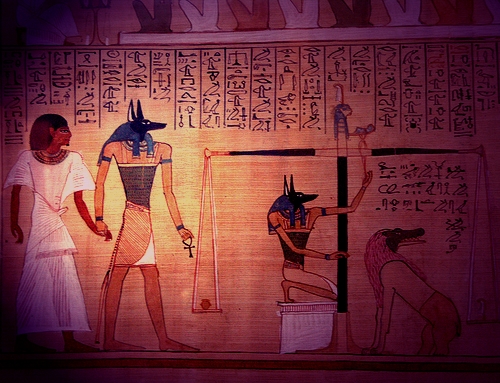
At the same moment, Hadrian breathes his last breath, to the horror of Sabina and Lucius and the others who are gathered at his bedside. In a state now beyond physical life, Hadrian opens his eyes to see Anubis standing before him with outstretched hands, lifting him out of bed and guiding him away down many dark corridors. At last, Hadrian is taken through a massive portal and into a chamber where Thoth is waiting beside scales placed before Osiris.
Thoth begins the Weighing of the Heart ceremony as Osiris asks who this person is who seeks admittance to his realm. In the midst of the solemn proceedings there is a loud banging at the portal and Anubis announces that someone has arrived to offer his own heart in exchange for the emperor's heart, so that Hadrian might live and walk the earth again. That person is standing unseen just outside the portal. After brief discussion, the Egyptian deities acknowledge that the Law of Maat specifically envisions such an exchange and that, indeed, it is the most sacred and powerful of covenants surrendering one's own heart on the Scales of Truth for that of a loved one. Such love cannot be denied. The offer cannot be denied.
Genesthoi So Be It Done!
Back at the death bed in the Hermopolis villa, Hadrian gasps suddenly and his eyelids fly open, to the amazement of everyone who thought he had just expired. Sensing what has happened, he speaks hoarsely of a vivid dream involving deities. He looks around and demands to know where Antinous is.
"Where is he? What have you done with him? I know he would be here at my side if he were physically able. Bring him to me at once!"
But as Sabina and Lucius stammer excuses, and before the runners can summon Antinous, a boat crewman bursts into the room with the news that Antinous is missing and presumed to have drowned in the Nile.
Hadrian suffers a relapse, but the Egyptian magic is well done. So he cannot die at this time. As the search for Antinous continues, with hope waning each day, Hadrian retreats to the rooftop observatory of the villa in Hermopolis which has been placed at his disposal by a wealthy Hermopolite. The emperor stares into the heavens night after night, refusing to give up hope that Antinous might yet be alive, perhaps dazed and confused and lost somewhere along the river.

Then one night he looks into the heavens and sees the proof that he has been looking for since the disappearance of Antinous. He summons the Empress and Lucius and the entire court and also calls for the chief astrologer of the Temple of Thoth in Hermopolis to come quickly.
He informs them that a new star has appeared in the heavens and that it is a celestial sign that Antinous has left this earthly existence to ascend to the pantheon of the gods. He has surrendered everything on behalf of his beloved emperor, just as he had always said he would. Everyone thinks Hadrian has suffered another relapse and is delusional with fever. But the astronomer arrives and swiftly confirms that the sharp-eyed emperor has indeed discovered an uncharted star.
As Hadrian leaves to issue orders for the deification of Antinous, construction of the city and erection of temples throughout the world, the astronomer remains behind in the rooftop observatory with the wealthy owner of the house. Where precisely is this new star, the owner asks. "I know quite a bit about the stars for an amateur, but I can't for the life of me see anything at the spot in the heavens where Caesar was pointing just a while ago."
The astronomer says that the new star is definitely there and that astronomers throughout the world will confirm its existence and it will be recorded duly in all the star charts.
"Yes, but can't you point it out to me?" the wealthy man pleas. "I'm straining my eys looking, but I just can't see anything."
The astronomer answers, "And that is why you will never be a good astronomer. You scan the heavens with your eyes, but not with your heart."
The novel ends with Hadrian seated at his villa outside Rome several years later. Sick and dying (this time for real), he is in an agony of pain both physical and emotional, as he has been ever since Antinous left him. With difficulty, he raises himself from his chair and shuffles towards a stunningly beautiful new statue of Antinous which has just arrived and been set up in his study.
Hadrian examines it with weary eyes and runs his trembling fingers over the face.

"You loved me as no other," he whispers. "Selflessly and unconditionally, making no demands upon me. I never fully appreciated you during your brief life. I had too little time. Gave you too little love. Made too many demands. Was always too impatient with you. Too little time. All too brief. And now all we had is over and gone forever. If only you would look at me once more and smile the way you used to smile, with that smile that was meant only for me. If only you would tell me once more how much you love me. If only you would give me one last kiss, one last bit of solace."
But the benign countenance on the statue's face remains fixed and unaltered, the cold and baleful eyes gazing languidly at some indefinite point beyond the emperor.
Hadrian shuffles back to his chair and sighs in grief as he sits down stiffly with one last glance at the statue in the flickering lamp light.
Okay, so Ernst Sommer's novel Antinous is lousy history. Antinous died in October of 130 and the star was not discovered until January of 132.
The book is good fiction, however. And it is a fascinating interpretation of the Hadrian/Antinous relationship as it might possibly have been. Sadly, it has never been translated into English.
Hadrian had everything unlimited power and boundless riches. But he lost the love of his life. He deified the love of his life and placed Antinous in the heavens so that we would remember HIM every time we look up.
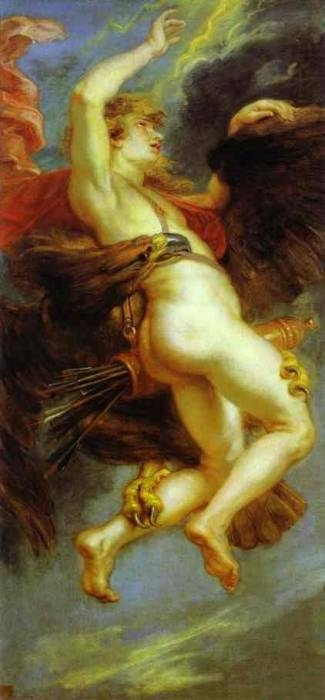
On January 22nd, as the Sun settles into the Sign of Aquarius, the Religion of Antinous pays tribute to the outstandingly beautiful young Trojan mortal named Ganymedes (Ganymede) who caused the bi-sexual king of the gods, Zeus, to fall in love with him and swoop him off to Olympus to be his celestial water boy. Or nectar boy.
The story goes that Zeus was in need of a cup-bearer at the time, since the previous holder of the job, Hebe, had tripped and fallen while performing her duties. Having a few cups of golden nectar dumped over him did nothing for Zues' already notorious temper, and he decided to combine business with pleasure and offer the now-vacant job to the handsome young man who had just caught his divine eye.
He therefore sent his messenger, a giant eagle, to carry Ganymedes to Olympus. In Classical Mythology it is called The Abduction and Rape of Ganymede. The Romans called him Catamitus, from which we derive the word "catamite" to describe such toy boys who are maintained by men of power and wealth.
Homophobic monotheists have viewed the story of Zeus and Ganymede with disgust throughout the ages, and use it as an example of the vile depravity of Greece and Rome. It's a straight man's worst nightmare: Being held captive as a gay man's plaything, never to enjoy a woman ever again.
But gay men throughout history have always interpreted the story differently. We see it from Ganymede's viewpoint. As we sit there in school, pimply-faced teenagers stuck in a humdrum existence surrounded by bullying heterosexuals. Who among us hasn't read the story of Zeus and Ganymede and wished that some all-powerful being would air-lift us out of there to live in splendor and to be loved and appreciated for all time, forever and ever?
Ganymede saw this as a good career move barman to the gods, living in otherworldly luxury, all expenses paid on Olympus, plus a great fringe benefit: lover to the king of the gods and so (times being what they were and Ganymede having no other job skills) he accepted the position. Not that he had much choice of course, with a giant eagle standing over him, conducting a cursory job interview.
Zeus was so pleased with him that he declared the eagle that had brought him to Olympus to be the greatest of birds, placing it in the heavens as a reward. To the Greeks the constellation was Aetos, The Eagle, while the Romans saw it as Ganymedes Raptrix, The Huntress of Ganymedes.
We know it today by another Latin name, as Aquila, The Eagle. In astronomy we have a bi-sexual planet, Jupiter (the Roman name for Zeus), still attended by his lover in the form of the moon Ganymede the largest moon in our Solar System.
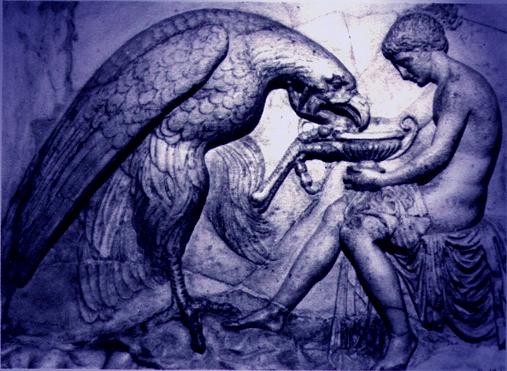
The parallels between Zeus and Ganymede and Hadrian and Antinous were unmistakable to the Romans, of course. Ganymede and Antinous both came from Asia Minor. Both were exceedingly beautiful youths. Both were carried away by the Eagle. For the Romans, of course, the Eagle represented the Emperor. And the Emperor represented Zeus/Jupiter.
The Divine Hadrian WAS Zeus/Jupiter. And Antinous was his constant companion, the bearer of the symbolic cup of youth-giving love and vibrance.
Just view the story from the viewpoint of Antinous. He was a youth who caught the eye of a living god, the most powerful man on Earth. And this divinity swept him up into realms of unimaginable riches and luxury and power and influence. The Imperial Court must have seemed like a Magical Realm populated by divine beings whose every whim became instant reality.
The relationship between the Emperor Hadrian and Antinous was compared with that between Zeus and Ganymedes (the emperor was, after all, a god), and, after Antinous' death in the Nile, this had a bearing on what followed. As well as naming a city in his dead lover's honor, Antinoopolis, and having him declared a god; the emperor ordered that he be placed among the stars.

The result was the CONSTELLATION OF ANTINOUS, which was located immediately below (and using some of the stars of) Ganymedes Raptrix, the eagle of Zeus bearing Antinous across the heavens to Hadrian, just as it had carried Ganymedes to Zeus on Mount Olympus. Given the relationship between Hadrian and Antinous, the mythological symbolism was perfect mighty god and beautiful young lover.
You won't find the constellation listed in any astronomy book however, nor will you find the correct version of either the story of Hadrian and Antinous, nor that of Zeus and Ganymedes. The former because it no longer exists, and the latter due to prejudice.
In the 17th century, Johannes Hewelcke of Danzig took stars from Antinous to form his own constellation of Scutum, representing the shield of his patron, King Jan Sobieski III of Poland. And by the end of the 18th Century, Antinous had been dropped altogether from the star maps, the remainder of its stars returning to Aquila, so that Antinous joins a long list of rejected constellations.
That is why you won't find it on any modern star chart. As to the mythological and historical associations, no astronomy publication, to my knowledge, has ever given the correct versions. They always refer to Ganymede simply as a young man taken to Mount Olympus to be a cupbearer, and Antinous as a "favourite at court" or some such euphemism, all in order to avoid the gay connections in both tales.
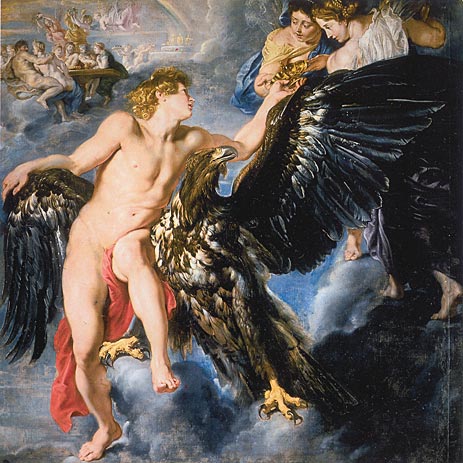
The major difference between the stories of Zeus/Ganymede and Hadrian/Antinous is the fact that Zeus/Ganymede were mythological beings and Hadrian/Antinous were real, live human beings who walked and breathed and ate and shat on this mortal Earth. That is also the salient feature of the Magnificent Religion of Antinous. Who knows whether Jesus of Nazereth (and Judas and all the others) actually ever existed? There is no tangible proof that they lived. Only scriptures.
But we know for a fact that Hadrian lived and that Antinous lived and died.
And a very curious thing happened in the heavens a couple of years after the death of Antinous. In the month of January shortly after the Sun entered the Sign of Aquarius.
On January 29th, a new star appeared just before dawn in the constellation Aquila, the Eagle. The skies were glowing rosy pink at sunrise as a bright new star appeared on the eastern horizon where the Constellation of Aquila was the Rising Sign of the new day.
The court astrologers declared that it was Antinous taking his place in the heavens. Hadrian ordered them to draw a new constellation embraced by the Eagle, and called it the Constellation of Antinous. The Roman historian Dio Casius was skeptical that a new star had appeared in the sky, but simultaneously, the leader of the Jewish revolt named Bar Kochba, whose priestly name means "Son of the Star," was declared the Messiah because a celestial event had proclaimed him the savior of Israel.
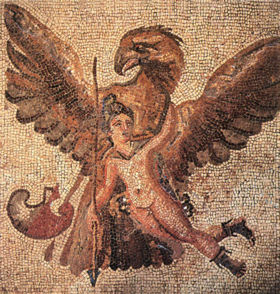
The mystery of the star is real, just as Hadrian and Antinous are real historical human beings. We know for a fact that a celestial event of great magnitude occurred shortly after the death of Antinous within the constellation of the Eagle for the New God. The three sacred stars of the constellation Aquila, named Tarzad, Altair and Alshain, rise above the horizon just before sunrise on this night and are an allegory for the assumption of Ganymede/Antinous into heaven. This date is suggested by Chinese Novae observations which have been dated as occuring on the 29th of January 132 AD, and are compared to the Star or Comet of Antinous.
At this time of year, the Constellation of Antinous is just beginning its long rise into the heavens following its conjunction with the Sun during the December Solstice. Antinous the God is rising toward his apex in the heavens next August when the Sun enters the Sign of Leo. That is the day we remember The Sacred Lion Hunt when Antinous took aim with his lance and arrow.
Tonight, when you look into the skies and see the waning face of ANTINOUS THE MOON GOD, think of the triumph of Antinous a real, living human being who was swept aloft to Olympian heights by the Roman Eagle and who became a God ANTINOUS THE GAY GOD. Let his arrows enter your heart and fill you with his divinity.
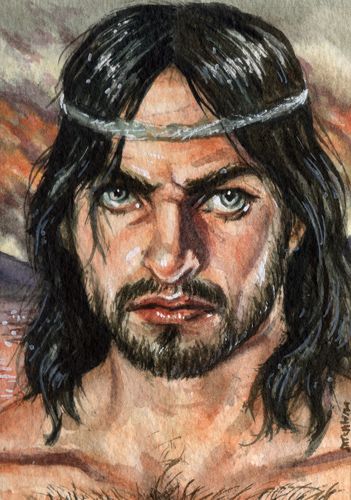
In recent days the most extraordinary works of Antinous art have surfaced, including this miniature portrait of Antinous (greatly enlarged at left) by the brilliant British visionary artist Mark Satchwill, whose subjects range from flowers to portraits to myth and fantasy.
It is a rare contemporary watercolor-and-gouache portrait of the "OTHER" Antinous, the Antinous for whom OUR Antinous no doubt was named. He is the Antinous of legend, the Antinous with an image problem. He is the "bad guy" Antinous. All depictions show him like this one by Mark Satchwill, looking like a parallel-universe Bizarro Antinous with definite attitude issues on a bad-hair day.
Why was Antinous named after the "OTHER" Antinous -- the infamous Antinous of Homer's Odyssey and the Iliad?
For the Ancients, names were not a matter of coincidence. A person's name MEANT something. Nomen est omen a name is a sign. So why was Antinous given the name of someone whose image is that of a rapist and a scoundrel?
Homer's Antinous was one of the "Suitors of Penelope," the group of moochers who showed up at her doorstep while her husband Odysseus was off fighting the Trojan wars, and who attempted to woo her and abscond with as much of Odysseus's fortune as they could before he returned -- if he EVER returned. After all, he had been gone for umpteen years.
Their argument was that he was a "dead beat" spouse and that he had abandoned Penelope and, at any rate, was most probably dead.
Antinous was the craftiest of the suitors and plied Penelope with costly gifts. Then at last at long last Odysseus returned in the disguise of a beggar. Only his faithful dog recognized him. Penelope did not!
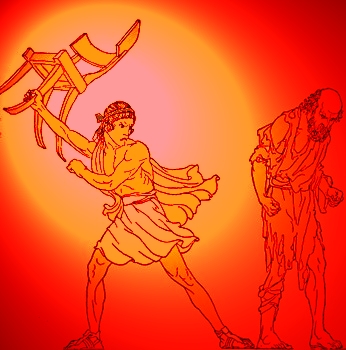
Antinous did not recognize him either and, thinking he was just a homeless street schizo, attacked him with a chair to drive him off. Later on, during an archery tournament, Odysseus "accidentally" shot Antinous and killed him.
As with much of The Odyssey and the Iliad, it is hard to tell who the "good guys" are and who the "bad guys" are. Homer's Antinous is not exactly a saint, but he isn't really guilty of any crime either, aside from willful destruction of a priceless antique chair, the sort of chair gay museum curators dream of owning.
Penelope is the guilty one. As so often in Greek mythology, the women are treacherous and untrustworthy (just think of Pandora). One small detail which they didn't teach me at Davy Crockett Junior High School in West Texas was that Penelope had sex with Homer's Antinous and with ALL the other suitors. Arch Priest Antonyus explains:
"And the resulting child from that pan-sexual tryst was born a little monstar with horns and hooves. He was called Pan becasue he was the son of Antinous and ALL the suitors. Penelope couldn't look at him, so she abandoned him, and he was taken in by Mercury, who absolutely adored the little monster.
"Ah yes, Penelope gave birth to Pan in Mantinea!"
Mantinea/Bithynia is the ancestral homeland of our own Antinous. So the name was of regional origin. But that is not the only connection because, in actual fact, Homer's Antinous was associated with magic, just as Antinous the Gay God is associated with magic and miracles.

Homer's Antinous was something of a wizard. According to legend, Homer's Antinous possessed the fabled Mirror of Vulcan, which was the model for other mirrors in Classical Greece, such as the one here.
Doubtless it had a matching lid to protect the burnished surface such as the exquisite mirror lid depicted below.
Vulcan's Mirror showed the past, the present, and the future. Sir John Davies tells us that Antinous magically convinced Eros/Cupid to steal the mirror and to give it to him, and that it was one of the gifts which Antinous gave to Penelope, and that she used it see into the distant future.
Pythagoras also owned Vulcan's Mirror and used it for magical purposes, according to legend. Pythagoras was not only a master mathematician and astronomer/astrologer, but was also a philosopher noted for his theory of the "transmigration" of souls after death. He claimed he had undergone many reincarnations.
Legend has it that he clearly remembered being Aethalides (son of Hermes) and also Euphorbus the Mantinean (son of Panthous) who slew Patroclus, which left Hector alive to kill the lover of Achilles.
To prove that the Mantinean claim, Pythagoras was taken to the Temple of Hera at Argos and asked to point out the shield of the son of Panthous, which he did without hesitation.
Other legends assert that his past-life memories allowed him to find the MIRROR OF ANTINOUS. Pythagoras would work a spell during the cycle of the Full Moon which involved writing the spell in blood (or according to one version, in semen) on the mirror and then turning the surface so that it reflected the moonlight straight back at the Full Moon. Doing that would ensure that the spell would work throughout all time, since the mirror transcended past, present and future.
Thus the name of Homer's Antinous was associated by the Ancients with magic and mystery, just as the name of Antinous the Gay God would be several centuries later. The Obelisk of Antinous speaks of healing visions and magical powers, and worshippers prayed to the Beauteous Boy for miracles.
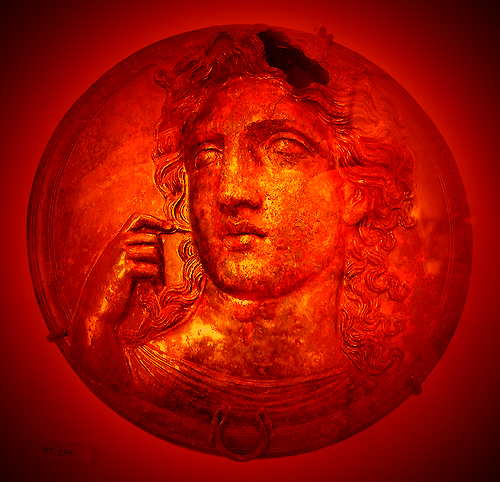
Hadrian of course, being an avid student of Hellenistic myth and lore and magic, would have known all of these Antinous connections. When he inquired as to the name of this cute boy and was told he was called "Antinous" -- the emperor's vast intellect would have been inundated with associations of science and myth and magic. He would have remembered Homer's Antinous and the MIRROR OF ANTINOUS in which one could see the past, the present and the future ...
The magic of mirrors, whether the reflecting surface of a looking-glass or the image seen in the woodland pool, still stimulates the imagination as profoundly as in ancient times. Mythology and magic alike bear witness to the powerful influence of mirror magic upon human thought.
The story of the MIRROR OF ANTINOUS which revealed past, present and future; the magic mirror of Merlin which gave warning of treason; the dreaded Smoking mirror of the Mayan world, the all-seeing mirror of Al-Asnam are just some examples.
Mirrors have been described as the door through which the soul may find freedom. The Greek Legend of Narcissus is the perfect allegory -- grasping at his reflected image in the fountain, the youth is absorbed, and then embraces death, to remain the undying symbol of falling in love with the divinity in the innermost heart of one's mortal self.
Homotheosis ... Gay-Man-God-Becoming-the-Same-As-Gay-Man-God.
Hadrian would have been aware of all of these things. The first time he heard the name "Antinous" the seed would have been planted in the Emperor's mind for a brilliant new religion incorporating his ideals of Hellenistic Beauty and Love, as well as his fascination with Magic and Mystery Teachings.
In ordaining the Religion of Antinous, the Divine Hadrian has placed the magical MIRROR OF ANTINOUS in our hands. He intends for us to hold it firmly in our hands and to gaze into its burnished surface and to write the spells which transcend past-present-future in the silvery face of ANTINOUS THE MOON GOD. He wants us to see Antinous shining from within us. And he wants us to grapple with the parallel universe divinity within us called Antinous and allow it/him to bend us and change us into His own past-present-future likeness.
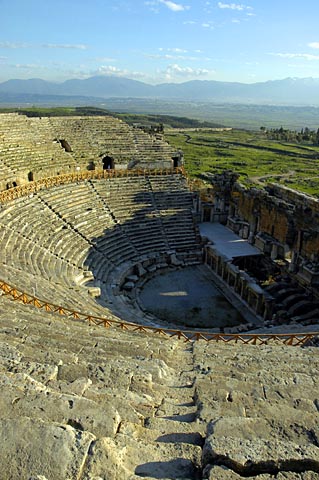
It was on this day in January of the year 130 AD that the Imperial entourage of Hadrian and Antinous arrived in the sacred city of Hieropolis in Asia Minor on what would be one of the last festively upbeat stops on the emperor's fateful final tour of his sprawling empire.
Today only scattered ruins remain, including those of the amphitheatre which was built in honor of the Divine Hadrian's visit in late 129 and early 130. But in its heyday, Hieropolis was a city of 100,000 inhabitants and was noted for its fine temples and, above all, for its healing thermal springs -- hot springs which to this day continue to draw people seeking healing relief.
Apollo was the chief god of Hieropolis, along with Pluto, whose healing energies fed the miraculous thermal springs which were famed throughout the Roman Empire.
But the most extraordinary temple in this Sacred City of Temples was indeed the Temple of Astargis, a Hellenized form of Astarte-Venus. The Temple was famous (or "infamous" in the view of early Christians) for its sacred prostitutes, the "hierodules", who were priestesses of the love goddess.
The Bible mentions Hieropolis briefly as an iniquitous site of whoredom and wickedness, an obvious reference to this Temple. The Christians did their worst to convert the city. Paul came here. And the Apostle Philip proselytized in this city for three years before finally being stoned to death. He was buried in Hieropolis.
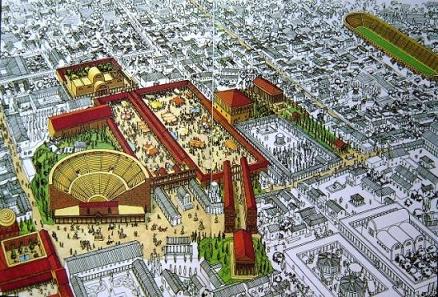
Like the thermal waters seething in the Plutonium (Pluto's Sacred Cave), Hieropolis was a seething hotbed of religious turmoil.
Against that backdrop, Hadrian and Antinous arrived to a joyous welcome. Because of his devotion to the Goddess Venus, Hadrian most certainly would have visited the Temple that was the center of a large, wide-spread cult.
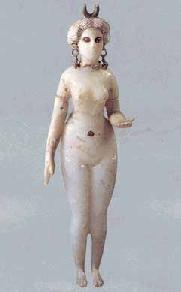
The temple was an imposing edifice whose portals were flanked by towering phallic sculptures. Inside, the temple catered to every sexual persuasion.
Yes, there were also homosexual sacred prostitutes, who likewise served the goddess to the best of their ability.
Arch Priest Antonyus Subia believes the connection between their office and the function of Antinous as the lover of Hadrian may have facilitated his initiation into their cult. Thus, Antinous may have been an Honorary Sacred Prostitute.
In the words of Antonyus: "We honor the ancient cult of Astargis out of love for Antinous, and seek to embrace and understand the function of the hierodules.
The Imperial entourage's visit to Hieropolis must have left bittersweet memories in the Emperor's mind. The rest of the trip would be decidedly less pleasant. Angry Jewish mobs in Jerusalem and Alexandria. Christian rabble-rousers everywhere. A famine in Egypt.
And then one accursed day in the far reaches of Upper Egypt his Beloved Boy would drown in the Nile. Hadrian would return to Rome a changed man, a man broken in mind and spirit. His glorious reign would descend into cruelty and war-making.

Go outside this weekend and you will be witness to an extraordinary Stellar Alignment. Not only is this the weekend of the first Full Moon of the New Year 2009, but it is also the weekend when the Sun aligns with the STAR OF ANTINOUS.
The followers of the Religion of Antinous are spread around the world.
The moment of exact alignment occurs at 7:28 p.m. PST for members of the Hollywood Temple of Antinous.
But for those of us who live in the UK or continental Europe, the alignment occurs in the wee hours of January 11th.
And for our brothers in Sydney and Melbourne, this extraordinary celestial event is at 2:28 p.m. Sunday afternoon.
It is the same celestial moment, though the hands on the clocks point to 23 different hours. For some of us, it is the dark of night and the Cancer Full Moon shines bright in the middle of the ice-cold winter sky.
For some of us, it is broad daylight on a balmy mid-summer's day. And yet ... and yet ... for Antinous the Gay God it is the self-same moment. This is the day, the wee hours of January 11th, when we celebrate Victoria Antinoi -- the Victory of Antinous over the forces of Darkness.
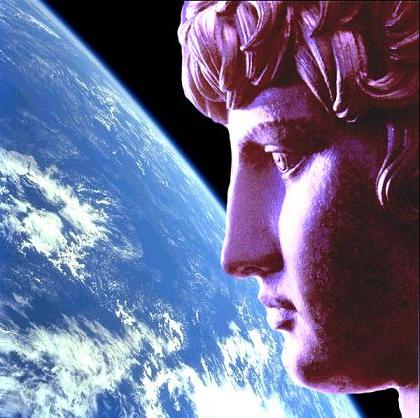
Arch Priest Antonyus Subia explains that this victory marks ...
"The completion of Antinous' mummification, and his defeat of the final archon. Antinous in glory and radiance, stands between our cosmos and the abyss that is known as the Veil. He has returned as Antinous the Savior.
"This is the End of the sacred period of 72 days following the earthly mummification of the body of Antinous. The preservation of his perfect body was completed by the Egyptian priests, providing him with a carnal vessel for millions of years.
"This is the day upon which Antinous overcomes the 72 princes who rule over the cycles of life and death in the underworld and the outer limit of the cosmos, and our god becomes Antinous the Victorious.
"This is the Coming Forth by Day of Antinous. His triumph becomes the celestial procession, and together with the saints and blessed spirits of the immortals and divinized men, Antinous prepares to step away from the limit of the cosmos and enter the darkness of the void beyond."
So wherever you live on this Blue Marble which we call our home planet Earth, I urge each of you to go outside and say a prayer of thanksgiving to Antinous the Gay God.
If it is daytime where you are then you can look up at the Sun as it aligns with the STAR OF ANTINOUS. If it is nighttime, then you can look up at the bright, full face of Antinous the Moon God.

The first full week of January is when the Religion of Antinous commemorates a week of holidays in our Liturgical Calendar which, at first glance, don't seem to have any relation to each other -- the Minor Baccanalia and the Massacre of Christians at Antinoopolis and Victoria Antinoi the final victory of Antinous over Death.
But a closer look reveals that the Religion of Antinous and early Christianity were subject to much exchange of concepts. Antinous was the last pagan god of the Classical age, and his priests were contemporaries of the early Christians, who were squabbling among themselves over how to present the story of their own fallen young Man-God, the slain Jesus of Nazareth.
The story of Antinous the Gay God is the story of the clash between the last of the Greco-Roman pagans and the earliest of the Christians. The two religions borrowed heavily from each other. They lived side-by-side in the cradle of the Nile. Christians lived in the Sacred City of Antinoopolis and initially were subjected to cruel abuse by pagans -- before they finally got the upper hand and cruelly suppressed the pagans.
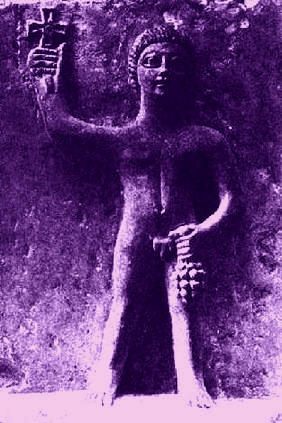
A stone relief (at right) depicts a Antinous-Dionysus holding a Coptic cross in one hand and a bunch of Baccanalian grapes in the other. Only the hair style reveals that this is supposed to be Antinous and not Jesus.
And, like modern-day Republicans and Democrats, the followers of these competing religions waged ideological campaigns to portray their rivals as lost souls.
The homophobic hysteria of many modern-day Christians can be traced directly back to the grim determination of those earliest Christians to distance themselves from the popular cult of the beautiful Man-God Antinous who, like Jesus, held out the prospect of salvation to his followers.
Those earliest Christians went to great lengths to portray the Gay God as a demon and as Satan incarnate. They very literally "demonized" Antinous and condemned his followers as devil-worshippers.
Thus this is the story of the religion-fired hatred that has led to so much suffering for gay men and lesbians throughout history. To understand Antinous is to understand why many Christians to this very day are staunchly convinced that homosexuals are possessed by a demon or by Satan. What they sense in us is in fact Antinous the Gay God.
So the story of Antinous is the story of all gays. It is the story of you and me. And that means that the story doesnt start on the banks of a great river on the edge of the desert, it starts instead with the place where you were born, because the legacy of Antinous has in part shaped your life.
Each of you is a Priest of Antinous...of an ancient cult that was destroyed...and has remained dead...and is now reborn...in us...because we love him...and we want to raise his memory from the dead. There has been no cult of Antinous for 1,900 years, not a single priest.
The magnificent Religion of Antinous was dead.
And though there have been a few here and there who over the centuries have claimed to be priests and have been devoted to him for decades, none of these have loved him with enough passion to refound his cult. None came forth and said that the deification of Antinous was true or stood up and proclaimed "I beleve in Antinous."
But now we have. And more than that, we don't just say that we believe in Antinous and that his deification is true. We have adopted the cause which Hadrian proclaimed to the world. We identify ourselves as the successors of the ancient Priesthood of Antinoopolis, the sacred city founded on the banks of the Nile where Antinous drowned. We are not a new religion. We are the same religion that worshipped Antinous in Roman times.
The barbarians succeeded in putting us down. But our priestly predecessors loved Antinous so deeply and had so much faith in him that they carefully buried their treasures in the ground where he would be safe until the fires had burned over.
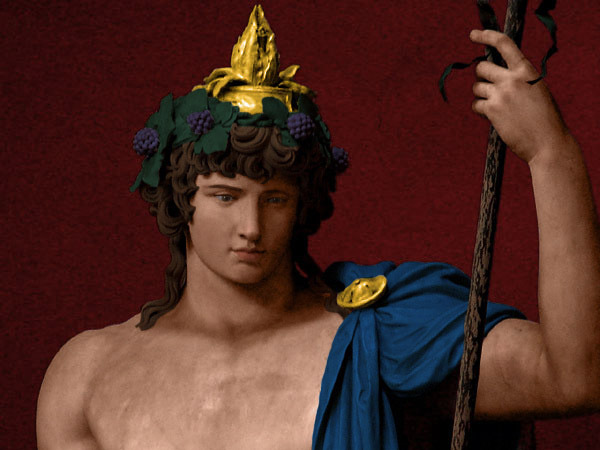
We are that power. You are that power. The power is ignited in us. Even if you have never heard of Antinous before this moment, he has always lived within your heart.
I once asked Arch Priest Antonyus Subia what made him certain I was worthy to be a priest of Antinous. He told me:
"You are a Priest of Antinous. For there is one qualification you have, the most important and sacred of all your personal attributes...that you are a homosexual.
"That is why you are worthy to be a Priest of Antinous. You can't change the fact that you are gay, it wasn't your choice, and you would never consider changing your sexuality even if you could.
"You will always be a homosexual, because Antinous made you gay."
Those are words which are worth repeating aloud to all followers of Antinous the Gay God. He selected us from all others. Every gay boy has felt this touch of specialness. We have felt it all our lives. Our Homosexuality is Sacred. Antinous is the Man-God within us. And we are Antinous the Gay God.
So this week, during the Minor Baccanalia, or Lesser Festival of Dionysus, we raise our glasses to the true-life mortal boy who became a god. The festival is celebrated when the autumn wine has reached fermentation. Traditionally a secret ceremony limited to women, it was opened to men during Roman times.
Arch Priest Antonyus Subia explains, "Mythologically this is the occasion when the Titans lure and capture the child Dionysus, charming him with a mirror and toys. The Titans murder him, rend his limbs from his body and eat his flesh. This is the first Wine festival and triumphal procession of the entourage of Dionysus whose arrival signals the Victory of Antinous over the forces of life and death as represented by the Archons."
Later this week we raise our glasses in memory of a group of Christians in Antinoopolis who were executed for their refusal to believe in Antinous. On January 8th during the persecutions of Diocletian in the year 286, St. Anthony, St. Anastasius, St. Vasilissa, St. Celsus, St. Marcionilla, St. Julian, seven children, and 20 soldiers were all put to death for their belief in Jesus.
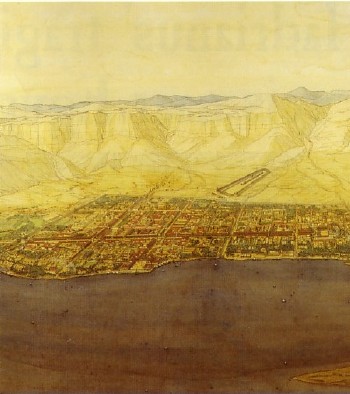
Because their death took place in our Sacred City Antinoopolis, we honor their memory and courage in the face of ignorance and violence. Our Sacred City has always been a center of religious fervour throughout history. From pagan times, through Christian times, and even down to the modern era, this area of Upper Egypt along the Nile has always been a hotbed of religious feeling.
In recent months, Islamic Fundamentalists abducted Coptic monks from a monastery only a few kilometers away from the site of our Sacred City. The Islamic radicals accused the monks of seeking to spread Christianity by expanding their monastery compound. Riot troops were called in to resolve the hostage-taking.
We pause this week to condemn the very sort of religious intolerance which bedeviled our own Sacred City in ancient times -- and which continues to bedevil it even today.
Arch Priest Antonyus Subia explains this seemingly contradictory stance: "The Religion of Antinous condemns the persecutors for the murder of innocents, and begs forgiveness for the cruelty of our ancient citizens and for the negligence of the ancient priests. We dedicate this day, on which these souls were martyred for Christ as an occasion of shame and sorrow, and as a reminder that we must never persecute our human brothers and sisters.
"In our love for Antinous, we pray for the holy and consecrated souls of these martyrs who died in our Holy City because they would not honor our gods. Intolerance in all forms is the final restraint that holds Antinous prisoner in our cosmos. The final three days before the liberation of Antinous the God, is sacred to the Holy Christian Martyrs of Antinoopolis, whose forgiveness we seek for our own liberation."

This liberation is commemorated on January 11th, the Feast Day of the completion of Antinous' mummification, and his defeat of the final archon. Antinous in glory and radiance, stands between our cosmos and the abyss that is known as the Veil. He has returned as Antinous the Savior.
But what has any of this to do with us as gay men living in the 21st Century? If there is a God of the Gays, then why does he let us suffer?
It is so hard to see any divine plan in our everyday lives. We seem to be so powerless, so very much at the mercy of merciless powers which are oblivious to our wishes or our needs. We look at those glistening eyes of Antinous and wonder -- does he care? Why does he let bad things happen to those who love him?
And yet ... and yet ... there are those moments which make us realize there just might be a Divine Plan after all and that Antinous does care.
He is so mysterious. He is so unapproachable. The Obelisk of Antinous says he works miracles. It says he brings healing dreams to us as we sleep. But so often we wake up the morning and our troubles weigh upon us worse than they did the night before.
And yet ... and yet ... there are those moments when we feel his gentle hand and we know he has moved and acted on our behalf -- perhaps not in any way which we could possibly have anticipated. Not in the way we had necessarily hoped. But in a way which amazes us with its sublimely mysterious logic.
Usually, it is when we have given up hope that Antinous steps in and does his mysterious thing. The more we try to hold on and to control the situation, the more oblivious he seems. And yet ... and yet ... when we just give up and let go, he does his mysterious thing.

For many of us, trying to maintain control in our lives is a bit like trying to maintain control on a roller-coaster. The ride has its own mysterious logic and is going to go its own way, regardless of how tightly you grip the bar.
There is a thrill and a power in simply surrendering to the ride and fully feeling the ups and downs of it, letting the curves take you rather than fighting them.
When you fight the ride, resisting whats happening at every turn, your whole being becomes tense and anxiety is your close companion. When you go with the ride, accepting what you cannot control, freedom and joy will inevitably arise.
As with so many seemingly simple things in life, it is not always easy to let go, even of the things we know we cant control. Most of us feel a great discomfort with the givens of this life, one of which is the fact that much of the time we have no control over what happens.
Sometimes this awareness comes only when we have a stark encounter with this fact, and all our attempts to be in control are revealed to be unnecessary burdens.
But we can also cultivate this awareness in ourselves gently, by simply making surrender a daily practice. At the end of our meditation, we might bow, saying, "I surrender this life and place myself in the hands of Antinous." This simple mantra can be repeated as necessary throughout the day, when we find ourselves metaphorically gripping the safety bar.
We can give in to our fear and anxiety, or we can surrender to this Great Mystery with courage. We thus banish all fear and all doubt from our hearts.
When we see people on a roller-coaster, we see that there are those whose faces are tight with fear and then there are those who smile broadly, with their hands in the air, carried through the ride on a wave of freedom and joy. This powerful image reminds us that often the only control we have is choosing how we are going to respond to the ride.
And that is the moment -- when our hearts are free of fear and doubt -- when Antinous can step into our hearts and do his mysterious thing. When we stop struggling and white-knuckling the bar, and when we just give up and just let go ....
Perhaps we shouldn't try so hard to understand the God's mysterious ways. Perhaps we should just accept that his ways are mysterious. There is an Ancient Egyptian inscription (stolen by the Hebrews) which says:
"For the God's thoughts are not the thoughts of us mortals, neither are the God's ways the ways of us mortals."
As we look back over the past year, perhaps the ultimate New Year's message to us from Antinous the Gay God is:
"My ways are mysterious. Get used to it!"
January 11th marks the Coming Forth by Day of Antinous. His triumph becomes the celestial procession, and together with the saints and blessed spirits of the immortals and divinized men, Antinous prepares to step away from the limit of the cosmos and enter the darkness of the void beyond.
It is only by letting go that we open our hearts to the Gay Spiritual Liberation that Antinous the Gay God offers us with all his heart. We stop struggling and we stop despairing at our lack of control. We stop trying to control the course of the roller-coaster and, instead, we just sit back and enjoy the thrills and spills. We stand proudly and contentedly beside the portals of our Spiritual Home within the Sacred City of Antinoopolis.

ALL RIGHTS RESERVED
PERMISSION MUST BE GRANTED BY THE AUTHOR FOR USE ELSEWHERE